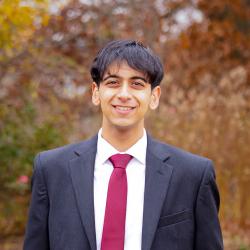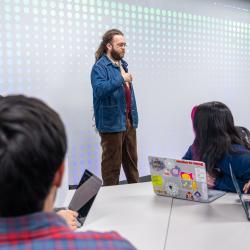Meet UMD Computer Science Major Jeremy Krach
Welcome to our new series, where we'll introduce you to Terp student scientists from the University of Maryland's College of Computer, Mathematical, and Natural Sciences.
Meet Jeremy Krach, a sophomore computer science major at UMD who recently placed third (out of 4,900 participants) in IBM's Master the Mainframe Contest. Krach, who is from Timonium, Md., attended Loyola Blakefield High School.
Why did you decide to attend the University of Maryland?
For me, both the open house and the Advanced Cybersecurity Experience for Students (ACES) swayed my opinion. ACES showed promise as a brand new program that would expose me to the growing field of cybersecurity and the businesses that drive it. The courses offered in the computer science major showed the combination of technology and critical thinking that I wanted from my college experience.
What attracted you to your major?
Interestingly enough, I did not see myself as a computer science major during my senior year of high school. When applying for Maryland, I entered “undecided” as my primary major, with computer science second and English third. As I arrived at the open house, my nametag said “computer science” in bold letters on it. After attending the talks of the day, I immediately saw computer science as a field that would engage me. I made up my mind.
What organizations are you involved with at UMD?
I am primarily involved with ACES. I have enjoyed the multitude of opportunities ACES has provided me, including summer internships and on-campus research. I am involved with SEAM, or Software Engineering @ Maryland, and MC2 (Maryland Cybersecurity Center). I am an active member of SEAM as an undergraduate research assistant, and I worked on a summer research project for MC2. I am also a member of the ACES Cybersecurity Competition Team. The competition team allows me to test offensive and defensive cyber skills and put them to the test against other college students in various competitions. As education chair of the ACES Student Board, I focus on our extracurricular events led by cybersecurity professionals. This position allows me to impact the program that has had such a profound effect on my schooling thus far.
Best memory so far as a Terp?
One of my best memories as a Terp came very early in my freshman year. Inexperienced in computer science, but driven toward cybersecurity, I attended the MHacks hackathon at Michigan University. I believed my experience in high-school cybersecurity competitions would make me a strong contender at such an event. However, after stepping onto the bus, I quickly learned ‘hackathons’ were more about creating new technologies in a short span of time using programming and engineering knowledge. Although I was severely out of my depth, three upperclassmen chose me to participate on their team, and we went on to build a side-scrolling platform game that used facial detection through a webcam to control the character. The acceptance of my fellow students as well as their mentoring and teaching attitudes allowed me to learn from the experience and it still tops many experiences I have had thus far at Maryland.
Favorite class so far and why?
My favorite class seems to change every semester as I delve deeper into my computer science courses. Last semester, I took 'Introduction to Computer Systems,' a class exploring systems programming in languages like C and assembly. This low-level understanding of how computers work has encouraged me to get more excited about my major. However, I am sure that course will quickly be replaced as I take more courses in my major.
Favorite professor so far and why?
Dr. Jim Purtilo. Last spring Dr. Purtilo taught an Honors College seminar on the contention between privacy and big government. In this class, he encouraged all of the students to engage in independent and original research projects. During the class, I worked with a fellow student on a research project investigating the privacy of biometric facial data on the Internet, and the feasibility of building a large-scale facial recognition system using Google Glass. This project was formative for me, and Dr. Purtilo’s guidance and advice cannot be overstated. Additionally, he invited me to join SEAM as an undergraduate research assistant. I have continued to gain unique insight and an engineer’s eye for solving problems. I have learned very much from Dr. Purtilo, and look forward to continuing to learn!
What advice would you give prospective students in your major?
Computer science is an exciting field. However, with its flashiness also comes its high speed. The best advice I have been given about this field is simple: stay motivated to learn, and always look for new skills and knowledge. Keeping the blade sharp allows one to keep up with the intensity of the major and field, but also excel and gain the most from the experience.
What do you do in your free time?
Most recently, I participated in a national competition run by IBM called “Master the Mainframe,” which lasted several months. Fortunately, I was able to adapt to the new terrain of mainframe programming in languages such as COBOL and JCL, and took third place in the overall competition. I also proudly bear the computer science stereotype of being a nerd: I enjoy my fair share of Star Trek and video games when not spending time with my friends in the ACES program and across campus.
What do you want to do when you finish your degree?
Upon graduating, I hope to be a cyber software engineer. I would like to combine my computer science and cybersecurity background to engineer tools that allow analysts and defenders to better protect critical systems. I also would like to take some time to travel the world.
Has your time at Maryland influenced or changed your future plans?
Very much so. I came into Maryland without listing computer science as my desired major. As I have grown from the ACES and computer science programs, I have begun to see my future much more clearly. I now see myself as an active member of the cybersecurity community, and I hope to become a contributor to the systems that make our nation and world safer from cyber threats.
Media Relations Contact: Abby Robinson, 301-405-5845, abbyr@umd.edu
Writer: Nikita Mehta
University of Maryland
College of Computer, Mathematical, and Natural Sciences
2300 Symons Hall
College Park, MD 20742
www.cmns.umd.edu
@UMDscience
About the College of Computer, Mathematical, and Natural Sciences
The College of Computer, Mathematical, and Natural Sciences at the University of Maryland educates more than 7,000 future scientific leaders in its undergraduate and graduate programs each year. The college's 10 departments and more than a dozen interdisciplinary research centers foster scientific discovery with annual sponsored research funding exceeding $150 million.







